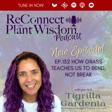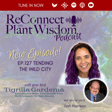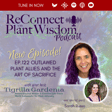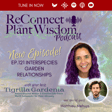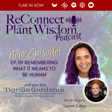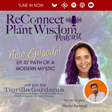
Ep.130 Radical Lives in Theatre: Embodied Eco-Feminism with Karen Malpede
What happens when activism, ecology, and art merge into one radical act of remembrance?
In this episode of Reconnect with Plant Wisdom, I sit down with playwright, author, and eco-feminist Karen Malpede to explore how theater becomes a living witness to humanity’s evolving relationship with nature. Together, we dive into the roots of eco-feminism, radical creativity, conscious death, and what it truly means to embody change.
Through her decades of work—intertwining ritual, activism, and performance—Karen reveals how storytelling can reawaken our ecological memory and call us back into relationship with Earth.
If you’ve ever wondered how art can transform consciousness or how to live in rhythm with the cycles of creation and loss, this episode will move you deeply.
What You’ll Learn About Eco-Feminism & Art
🌱 How eco-feminism bridges activism, art, and embodied awareness
🌱 The power of theater as witness, not protest
🌱 Why slowing down time can change perception and restore connection
🌱 How creative expression mirrors ecological regeneration
✨ Resources ✨
🌱 Expanded Show Notes
🌱 Karen Malpede’s memoir Last Radiance: Radical Lives, Ripe Deaths (Vine Leaves Press)
🌱 Naturally Conscious Community (NCC) — Join the Ecosystem)
👤 Guest Spotlight 👤
Karen Malpede is a groundbreaking playwright, director, and author whose work spans more than six decades at the forefront of political and ecofeminist theater. Her upcoming memoir, Last Radiance: Radical Lives, Bright Deaths (Vine Leaves Press, October 2025), is a powerful reflection on love, loss, and the enduring role of art in times of grief and transformation. Karen brings a rare and resonant voice to conversations about creativity, legacy, and the human spirit.
🔗 Connect & Explore More
🌿 Website
🌿 Contact
🌿 Shop Eco-Conscious Partners
Socials
📸 Instagram
📘 Facebook
💼 LinkedIn
▶️ YouTube
🎵 Credits
Opening + Closing music by @Cyberinga and Poinsettia



